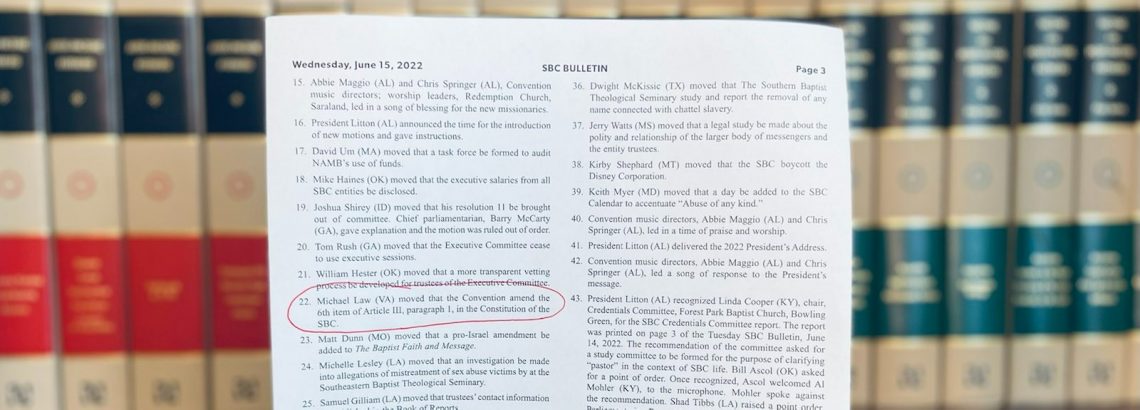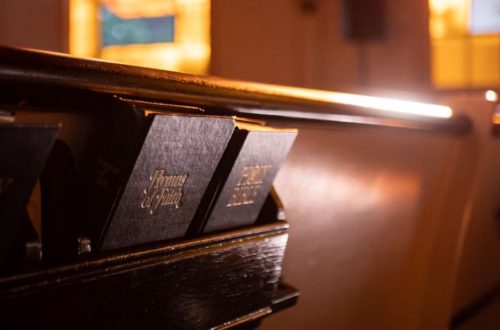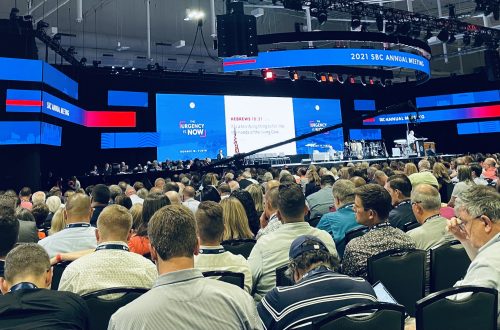The Baptist Press (BP) is the official news service of the Southern Baptist Convention (SBC), and in the last two days BP has run three different news items airing the perspectives of opponents to the Law Amendment. The first focuses on remarks from James Merritt who proposed a task force that some people hope will offer an alternative to the Law Amendment.† The second is a video interview with J. D. Greear who makes the case against the Law Amendment. And the third is a news report with an ominous headline about the Law Amendment, “Greear foresees ‘nationwide hunt’ if SBC amendment passes.” BP published one article featuring comments from Juan Sanchez in June, and I’m told there will be another next week (Sanchez is a supporter of the Amendment).* In the meantime, I thought it might be helpful to examine the framing of the issues that appears in these news items.
1. Greear claims that basing cooperation on obedience to God’s word is “fundamentalism run amok.” I couldn’t disagree more with this characterization. Greear is responding to something that Pastor Mike Law wrote online, but it is neither helpful nor accurate to portray Law as a fundamentalist. He’s not a fundamentalist. He’s just a Southern Baptist pastor who loves God’s word and who aspires for Southern Baptists to be faithful to the word of God. He doesn’t deny that Southern Baptists have differences on tertiary matters. He’s simply arguing that Southern Baptists ought to be faithful to those things that we do agree the Bible teaches. Our areas of agreement are laid out clearly in the BF&M, which says that the office of pastor is limited to men as qualified by Scripture.
If a desire to apply the Baptist Faith & Message’s teaching to our cooperation is “fundamentalism,” then there are probably millions of Southern Baptists who will be surprised to learn that they are now “fundamentalists” on Greear’s definition. Greear has recently argued that clarity is kindness. If that is true on the matter of LGBTQ, then why call it “fundamentalism” when someone proposes clarity on female pastors?
At precisely the moment the entire West is losing track of gender, in which the nation’s teenage sons and daughters have almost no idea of how to distinguish a man from a woman, and in fact have been taught to feel like they’re being morally offensive to publicly state that differences exist—this is no time to lean into ambiguity over what the Bible teaches about gender and the office of pastor. Nor is it a time to encourage the SBC not to apply what our foundational documents clearly state. Contextualization, if it means anything, means removing unnecessary stumbling blocks while being utterly clear where the Bible and the gospel are clear. Perhaps there are some who believe the Bible’s teaching on gender and the pastorate are stumbling blocks. I believe the Bible is clear and that its teaching on gender helps people better understand the gospel of Christ’s love for his church. Therefore, in a moment in which our nation is losing track of these basic creational and gospel categories of man and woman, we love our lost neighbors best—we’re most missional and contextually sensitive—by being utterly clear about them.
2. The interview with Merritt claims that “Southern Baptists took a clear stance on the position of women serving as a lead pastor or elder in New Orleans, as shown with overwhelming votes to uphold the recommendations to disfellowship Saddleback Church…” This is characterization of the Saddleback vote in New Orleans is mistaken. Saddleback Church does not have a woman serving as senior pastor. Saddleback’s senior pastor is Andy Wood (a man), but the church does employ women in a variety of associate roles. And it was on that basis that messengers in New Orleans voted overwhelmingly to remove Saddleback. It is inaccurate to portray the vote in New Orleans as if it were merely about churches with female senior pastors. The Saddleback vote disproves that.
3. Greear wants the SBC to allow “latitude” when it comes to applying the Baptist Faith & Message (BF&M) to Southern Baptist Cooperation. In particular, he believes that the SBC shouldn’t “police the borders” when it comes to churches with female pastors. While he himself disagrees with women serving as pastors, he makes the case that the SBC should not take any action against churches with female pastors serving in associate positions. He warns that if the amendment passes, the Credentials Committee would likely go on a “nationwide hunt” to find and remove churches with female pastors serving in associate positions.
It’s a misunderstanding of SBC polity to suggest that the Credentials Committee would go on a “nationwide hunt” for churches with female pastors. The Credentials Committee does not and indeed cannot go hunting for churches to sanction. They can only respond to referrals, and even then, they do not always recommend the removal of churches that are referred to them. In any case, the messengers would have the final say on which churches are removed in the event of an appeal (as we saw with Saddleback).
Greear’s entire discussion seems to be operating under the assumption that the SBC Constitution currently allows churches to have female pastors serving in associate positions. This point of view is simply mistaken. The SBC Constitution requires cooperating churches to closely identify with the BF&M, which calls for biblically qualified men to serve in the office of pastor/elder/overseer. The SBC Constitution already has this requirement. The Law Amendment would not change that structure, it would simply clarify what is already there.
The truth of the matter is that the SBC already has the power to remove churches that employ female pastors. The SBC proved this in New Orleans when the Credentials Committee recommended the removal of Saddleback Church, which does not have a woman serving as senior pastor but does have women serving as pastors in a variety of associate roles. The messengers voted overwhelmingly to remove Saddleback on that basis. So even without the Law Amendment, the SBC can choose to remove churches with female associate pastors.
So then why is the Law Amendment necessary? The reason Mike Law offered the Amendment is because some Southern Baptists have claimed that the Constitution isn’t clear on this point. The Amendment is simply an attempt to provide clarity for those who need it.
4. The interview with Merritt warns that “the SBC is at a crossroads he hasn’t seen since 1979, when Adrian Rogers’ election as president began the Conservative Resurgence. That debate centered on the inerrancy of Scripture. Southern Baptists haven’t wavered on that stance… but the current discussion is more about interpretation and application.” The analogy to 1979 would seem to liken supporters of the Law Amendment to SBC “moderates” of the 1970’s. Is that really a helpful or unifying comparison to make? I would argue that it isn’t.
Also, the statement seems to imply that the “interpretation and application” of scripture have little to do with Southern Baptist cooperation. This also is inaccurate. Article 6 of the Baptist Faith & Message reflects an “interpretation and application” of the Bible’s teaching about the qualifications for the office of pastor. It says in no uncertain terms that “the office of pastor/elder/overseer is limited to men as qualified by Scripture.” That is what Southern Baptists have overwhelmingly affirmed about the qualifications for pastor. And that belief is already required by the SBC’s Constitution. Will the new task force recommend a structure that agrees with this perspective? Or will they recommend a change that goes against the BF&M’s “interpretation and application” of scripture?
5. Even though the task force hasn’t been named yet, the BP interviews seem to present the task force as an alternative to the Law Amendment.† Why is that? We don’t know who will be on the task force or what they will recommend. How do we know that their recommendation will be substantially different from the Law Amendment? It seems to me premature to treat these two proposals as either/or’s rather than as both/and’s. The very same messengers that voted overwhelmingly for the Law Amendment in New Orleans also voted for this task force. Clearly, they didn’t view those votes as alternatives but as both/and’s.
I don’t know what the task force will recommend. But I feel fairly confident that at the end of the day, this debate is going to boil-down to two alternatives. There will be one group advocating a constitutional structure that allows for cooperation with churches that have female pastors, and there will be another group that wishes to maintain a constitutional structure that does not. There will be no in-between position. Count me among those who will be voting to base our cooperation on the teaching of the BF&M. I’m hoping and praying that overwhelming majorities of messengers will vote to do the same.

†Two sentences originally read, “The first focuses on remarks from James Merritt who proposed a task force to come up with an alternative to the Law Amendment.” And “Merritt and Greear are presenting the task force as an alternative to the Law Amendment.” I changed both of these sentences to clarify that Merritt himself did not make the connection to the Law Amendment in his quoted remarks from the BP interview.
Merritt did, however, connect the motion to his complementarian beliefs in his prefatory remarks to his motion. Here is my transcription of Merritt’s remarks and original motion offered on the floor of the SBC on June 13, 2023:
Mr. President, I am a complementarian to the core. I am fully committed to every jot and tittle of the Baptist Faith & Message. But it’s become apparent to me we are in desperate need going forward of two things–clarity and consistency.
So I move that the convention authorize the SBC President to appoint a broadly representative task force from across our convention to study the issue of how this convention should deem churches to be in friendly cooperation on questions of faith and practice as laid out in Article 3.1 of the constitution referencing our adopted statement of faith and to bring back recommendations to the 2024 SBC annual meeting in Indianapolis for how we can move forward together in biblical fidelity, missional clarity, and cooperative unity.
*This sentence originally read, “Perhaps BP will be featuring commentary from supporters of the Law Amendment in coming days.” Brandon Porter has written today that BP has already featured one article with comments from Juan Sanchez, and they plan to release another next week. So I have updated the sentence to reflect that.






